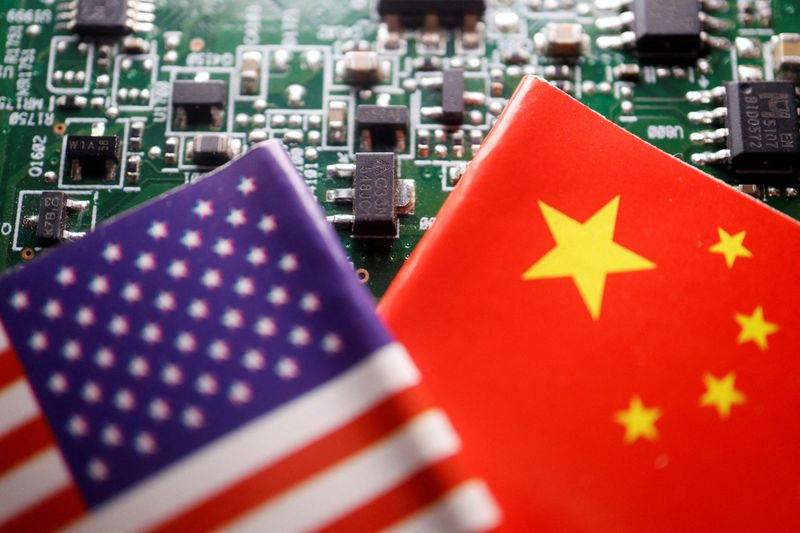By Karen Freifeld
NEW YORK (Reuters) – The Biden administration plans to unveil a new rule next month that will expand U.S. authority to ban the export of semiconductor manufacturing equipment from certain countries to Chinese chipmakers, two sources familiar with the rule said.
But shipments from allies that export key equipment for chip production, including Japan, the Netherlands and South Korea, are excluded, limiting the impact of the rule, said the sources, who were not authorized to speak to the media and asked not to be named.
Major chip equipment manufacturers such as ASML and Tokyo Electron are not affected.
The rule, an expansion of the so-called Foreign Direct Product rule, would bar half a dozen Chinese factories that are the heart of China's most advanced chip production from exporting to many countries, one of the sources said.
Countries whose exports would be affected include Israel, Taiwan, Singapore and Malaysia.
Reuters could not say which Chinese chip factories would be affected.
A spokesman for the U.S. Department of Commerce, which oversees export controls, declined to comment.
To block breakthroughs in supercomputers and AI that could benefit China's military, the US has imposed export controls on chips and chip-making equipment bound for China in 2022 and 2023.
The new regulations, which are still in draft form, show how Washington wants to keep up the pressure on China's growing semiconductor industry, but without antagonizing allies.
The Foreign Direct Product Regulations state that if a product is made using U.S. technology, the U.S. government can prohibit its sale. This also applies to products made abroad.
The rule has been used for several years to keep out chips made overseas by Chinese tech giant Huawei, which has reinvented itself after being hit by U.S. restrictions and is now at the center of advanced chip manufacturing and development in China.
Another part of this latest export controls package will reduce the amount of U.S. content that determines when foreign items fall under U.S. control, sources said, closing a loophole in the Foreign Direct Products Act.
For example, they say, equipment could fall under export controls simply because it contains a chip with American technology.
The U.S. also plans to add about 120 Chinese entities to its list of restricted businesses. These include a half-dozen chip factories (also called fabs), plus toolmakers, electronic design automation (EDA) software providers and related businesses.
The planned new rule is still in draft form and could still change, but it is expected to be published in some form next month, the sources said.
In addition to Japan, the Netherlands and South Korea, the draft rule exempts more than 30 other countries that are part of the same A:5 group.
The Commerce Department says on its website that it categorizes countries “based on factors such as diplomatic relationships and security concerns. These classifications help determine licensing requirements and simplify export control regulations, ensuring lawful and safe international trade.”
The planned exceptions are a sign that the US must be diplomatic when implementing restrictions.
“Effective export controls depend on multilateral buy-in,” said a separate U.S. official who asked not to be named. “We continually work with like-minded countries to achieve our shared national security objectives.”
(Reporting by Karen Freifeld; additional reporting by Alexandra Alper in Washington; Editing by Chris Sanders and Edwina Gibbs)

